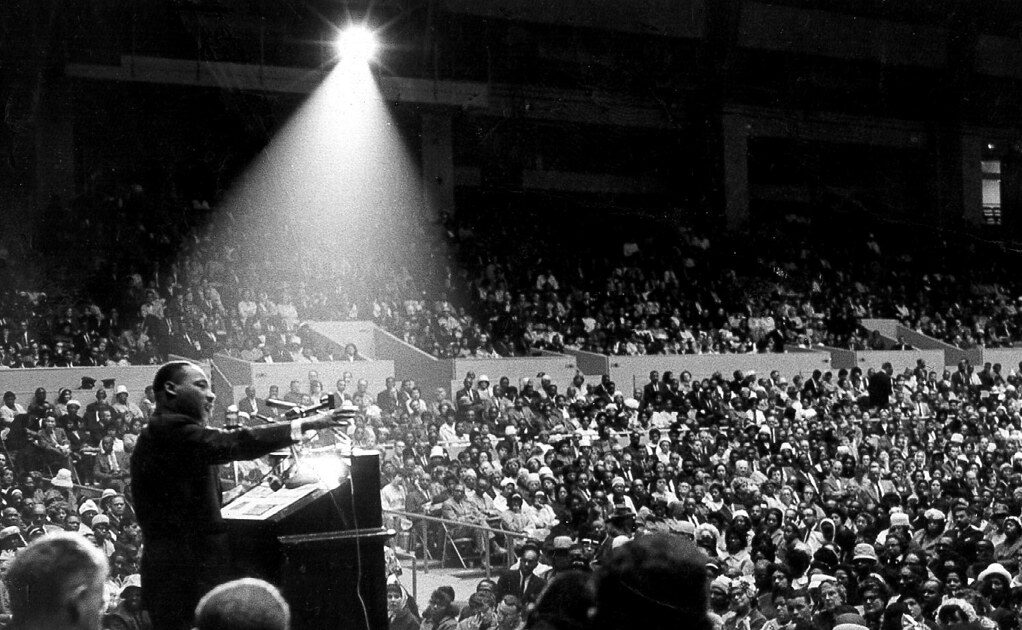MLK was a Pan-African
On the third Monday of January each year, Americans mark MLK's birthday with a public holiday. Africans should too.

Martin Luther King Jnr. speaking at a meeting in San Francisco in June 1964 (Image: George Clonklin, via Flickr CC).
Last night, on the eve of Martin Luther King Jnr. Day, an official holiday here in the U.S., I felt the impulse to go in search of references to MLK’s engagement with the African continent. Starting from when he was a guest of Prime Minister Kwame Nkrumah at Ghana’s independence in March 1957, where he told Richard Nixon (representing President Dwight Eisenhower): “I want you to come visit us down in Alabama where we are seeking the same kind of freedom the Gold Coast is celebrating.”
A few weeks later, back in the U.S., he gave a sermon “The Birth of a New Nation,” in Montgomery, Alabama, about his trip to Ghana. It is first class. It is part popular history of Ghana, a recounting of its independence struggle, what lessons for African-American struggle (“Ghana has something to say to us. It says to us first, that the oppressor never voluntarily gives freedom to the oppressed”), and, crucially, the challenges represented by the postcolonial (“This nation was now out of Egypt and had crossed the Red Sea. Now it will confront its wilderness. Like any breaking aloose from Egypt, there is a wilderness ahead.”). It is worth revisiting.
In 1960, in Atlanta, Georgia, King met with Kenneth Kaunda, then the leading anticolonial leader in Northern Rhodesia (now Zambia). Kaunda went onto play a crucial in liberation struggles in Southern Africa (Namibia, South Africa, Zimbabwe). Which is fitting that the second King speech I read, dealt with the topic was Apartheid South Africa. This speech delivered by King in in London in 1964 on his way to receive his Nobel Peace Prize. This speech is shorter, but just as powerful. It name-checks Albert Luthuli, Nelson Mandela and Robert Sobukwe. Significantly, King talks about how he “understands” the turn to armed struggle as well as calls for sanctions against South Africa. (The reference to armed struggle also contradicts what is often a stock characterization of King favored by American conservatives and liberals and U.S. mainstream media.)
There is also a separate speech, also on South Africa, that King delivered the following year at Hunter College. It is also worth checking out, as King expands on many of the arguments of the London speech and extends his call for sanctions to Portugal, for its colonies and violent repression of Africans in Angola and Mozambique.
What emerges in these speeches by and interviews with King, including on a range of other topics (.e.g. U.S. foreign policy, Vietnam, racism), is how “from the beginning of his ministry, King was far more radical, especially on matters of labor, poverty, and economic justice, than we remember,” as a post on Jacobin reminds us.
Finally, in a December 1960 audio interview, King reflected on his visits to Ghana and Nigeria and emphasized how closely African leaders and ordinary people were following the U.S. civil rights struggle. He explained that during his recent trip he spoke with many leaders of both newly independent African nations and those still moving toward independence, and they shared a common view: the United States could not credibly claim global leadership or moral authority unless it confronted racial injustice at home. King noted that Africans were well aware of the conditions facing Black Americans and saw racism and colonialism as fundamentally linked, since both rested on the same underlying disrespect for human life and dignity.



















